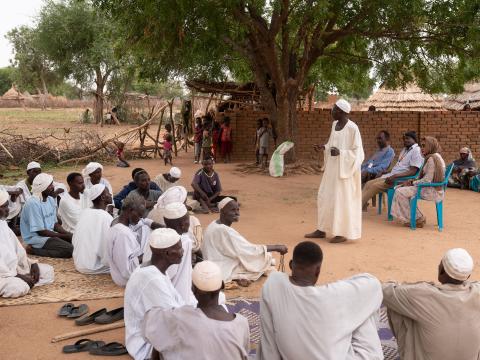World Vision Engages Local Protection Networks to Prevent Harmful Practices Against Children in East Darfur

According to the UN, approximately 87% of Sudanese women have undergone some form of female genital mutilation (FGM) with girls usually cut between the ages of five and 14.
In East Darfur, World Vision Sudan, with support from the Sudan Humanitarian Fund (SHF), engages local protection networks to address child protection issues including FGM and child marriage targeting the most vulnerable and at-risk girls and boys in Abu Jabra and Bahr al Arab localities.
The local protection networks, led by community and faith leaders from the target communities, provide counselling sessions, Gender-based Violence (GBV) response and prevention, and awareness raising campaigns.
World Vision trains the protection network members on child protection including the impact of harmful practices, such as FGM and child marriage, on young girls’ well-being. In addition to the capacity building, the protection networks also receive financial support from World Vision to host tea gatherings, important socialisation events in Sudan, to address issues in their communities.
The Abu Jabra protection network is composed of 24 members responsible for screening and reporting cases of violence taking place in surrounding villages to local authorities. The protection networks also use their platforms as agents of change spreading awareness on the risks involved in these harmful practices and the benefits of abandoning them.
According to Batul, a member of the Abu Jabra protection network, one of the main obstacles the network is facing is how deeply engrained the practice of FGM and child marriage is in the community and the topics being taboo.
“To gain the trust of the community and ensure they feel safe to share any new cases, we maintain the confidentiality of all those who come to report and ensure their full cooperation in every step of reporting. Through our awareness creation sessions, we are normalizing talking about FGM,” says Batul.
For Harna the weekly training sessions conducted by the Abu Jabra protection network in her village have provided opportunities for women to openly discuss issues of FGM and early marriage.
“I’m more aware of the negative effects of FGM on girls’ health as well as the harmful physical and psychological associations of early marriage. I play my part in reducing these practices by sharing information with my children, friends and neighbours who don’t attend the sessions,” says Harna.
Twenty-two-year-old Al-Nor Hamdan, feels that the participation of faith leaders as members of the network has ensured access to the local community. He says:
People tend to listen to and believe Imams when they talk about the risks involved in harmful practices like FGM. As long as faith leaders continue to participate in the network, our work will have more impact.
Challenges remain, including resistance from some sections of the community, but the protection networks are committed to getting as many advocates as possible to help reduce these harmful practices and protect children.
According to World Vision Protection Officer, Abdullah Sabil, no cases of FGM have been recorded since the launch of the protection networks in August 2022. The network carries out quarterly surveys to register cases of FGM and as Abdullah mentions:
The networks have helped reduce cases of FGM by reaching out to midwives conducting the practice. After dialogue, some of the midwives have pledged to give it up.
World Vision has so far trained 44 members of protection networks in Abu Jabra and Bahr al Arab.
- Story by Gamal Ghalab, World Vision Sudan Communications Officer.